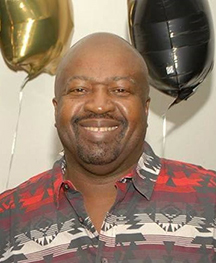The Working People’s Alliance (WPA) is still to pronounce on President David Granger’s unilateral selection of the new Guyana Elections Commission (Gecom) Chairman but party executive David Hinds says that the decision would only further divide an already “political trust-fragile” country.
Hinds plans to make his position known when the party meets to discuss the matter, which its executive says will be very soon.
“I think the President’s decision to unilaterally appoint the Gecom chair reflects how poisoned our political environment is. The decision by the President represents another colossal failure on the part of our political leaderships. If the President and the Opposition Leader could not find consensus on this matter, then I am afraid that our political future as a joint nation is bleak. We should wake up to the reality that our leaders on both sides do not have what it takes to manage our difficult, multi-ethnic society. That, to me, is the sad reality,” Hinds told Stabroek News yesterday.
“The President should have avoided making a unilateral decision. In doing so he has given a weapon to the PPP and other independent interests which are skeptical about the Coalition’s commitment to democratic governance. The president has not acted unconstitutionally as the PPP is bellowing—the constitution is clear about that and the Chief Justice has recently upheld that reading. But while the decision is constitutionally sound, it is politically senseless,” he said.

President Granger on Thursday unilaterally chose retired justice James Patterson, 84, to be Chairman of Gecom, rejecting a third list that had been submitted by Opposition Leader Bharrat Jagdeo.
In a rush on Thursday evening, Patterson was sworn in hours after he was first contacted by Granger and just after Jagdeo declared a campaign of non-co-operation with the government over the decision. It would appear that the hasty swearing in was held to avoid a legal challenge. Patterson will be 87 when the next general elections are due in 2020.
Hinds says that Granger acted prematurely as he believes that there was still room for compromise on the matter. He said that if Jagdeo continued to play hardball, the President should have continued to negotiate with him and let the process push him to unilateral action.
But Hinds said that while Granger made the final decision in the matter, Jagdeo should hold equal responsibility for the outcome.
“We have seen in the past that the role of the Gecom chair is pivotal in an institution where the two political sides have equal representation and they vote along party lines. The vote of the chair could indirectly affect the outcome of an election. During the PPP tenure, that party chose three Indian Guyanese to fill that position. All three are and were honourable men, but in our ethnically-divided society, their ethnicity is highlighted. In our ethnically heightened situation, that matters whether we choose to say it aloud or not. Many observers are convinced that Dr. Jagan and Mr. Jagdeo were very deliberate when they made their choices,” he said.
Other direction
“It is reasonable then to expect that this new government would want to go in the other direction—that is, to choose someone of another ethnic group in whom they have confidence. I think that was the unspoken position of the majority faction of the [APNU+AFC] coalition. But they did not have the courage to say so publicly because of the fear of being charged with ‘racialising’ the issue. So, the plan was simple—use a narrow reading of the constitution to achieve a political objective. That approach is standard political behaviour. I think the PPP and Mr. Jagdeo knew of this sentiment and set out to frustrate it. They were careful in all three of the lists not to give Mr. Granger an ‘independent’ African Guyanese acceptable to him. This, in my view, was very insensitive on the PPP’s part—they showed absolutely no respect for ethnic balance and for the symbolism of ethnic give-and-take,” he added.
Nonetheless, the Arizona State Political Science professor says that he believes that Granger should have had the wisdom to avoid handpicking a chairman since that decision has now given sceptics grounds to base their fears.
“The fact is that the PNC has more of the authoritarian tag than the PPP. So, the coalition should always resist doing things that smell of authoritarian intent. The PPP, as it has indicated, will milk this development for all its worth. They now have a symbolic reason to make the country ungovernable. This decision will not cost the coalition votes, but it would damage their image, which is already suffering. And the PPP’s position would find common ground with sections of the society which are partial to the coalition but suspicious of its democratic commitment,” Hinds added.





